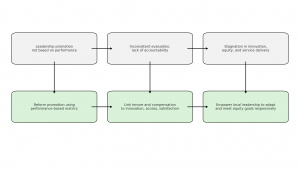Healthcare Leadership Failures Require Metrics and Meritocracy Reforms; Olumuyiwa Bamgbade, Salem Pain Clinic BC Canada
Canada’s Healthcare Leadership Requires Major Reforms, Including Meritocracy and Performance Metrics; Olumuyiwa Bamgbade, Salem Pain Clinic, BC, Canada
The healthcare system is entrenched in a rigid bureaucracy that values compliance and control over innovation and agility. Leaders often prioritize risk avoidance and status quo preservation rather than addressing systemic issues such as access delays, workforce burnout, or Indigenous health disparities. There are insufficient mechanisms for assessing healthcare leadership performance. Unlike in the corporate sector, where outcomes and returns on investment are monitored, poor healthcare leadership persists for years without evaluation or consequence, weakening the system’s capacity to evolve. Despite Canada’s multiculturalism, systemic xenophobia or ethnocentrism limits the inclusion of talented foreign-trained doctors or immigrant administrators in leadership roles.
Poor healthcare leadership causes widespread workforce burnout, low morale, and early exit of talented professionals. Leadership inertia deepens health inequities, particularly for Indigenous populations, rural communities, and low-income immigrants. Opaque decision-making and unresponsiveness to community needs reduce public confidence in the system and its stewards. Indeed, these problems weaken social solidarity and compliance with public health initiatives.
Canada’s socialized healthcare system requires deep reforms of its leadership. Leadership recruitment must be based on merit and transparency. Publicly advertised positions, independent selection panels, and standardized competency assessments must be embraced to mitigate favoritism and increase public trust. Health administrators and clinical leaders must be required to complete accredited leadership programs emphasizing systems thinking, equity, crisis management, and strategic innovation. Leadership reforms should include mentorship programs and leadership fellowships.
Leadership promotion must be based on performance metrics. Reforms must establish metrics and consistent evaluations for health system executives, linking tenure and compensation to outcomes in innovation, staff satisfaction, and patient care access. Performance evaluations must incorporate stakeholder feedback and external audits. Hospitals and health authorities should be allowed to innovate independently while maintaining accountability for equity and service delivery objectives by relocating decision-making closer to communities. Additionally, local leaders must be empowered to facilitate contextual adaptation and responsiveness.
Canada’s healthcare system cannot be resilient or equitable without transforming how its leaders are chosen, trained, and evaluated. Entrenched practices such as favoritism, exclusion, and neglect of formal leadership development have yielded a system strained by inefficiency and inequity. Meaningful reform requires embedding merit, transparency, inclusion, and accountability into leadership pipelines. By doing so, Canada can restore trust and workforce vitality and align its healthcare institutions with the diverse, evolving needs of its population.
Dr. Bamgbade is a healthcare leader with an interest in value-based healthcare delivery. He is a specialist physician trained in Nigeria, Britain, the USA, and South Korea. He is an adjunct professor at institutions in Africa, Europe, and North America. He has collaborated with researchers in Nigeria, Australia, Rwanda, the USA, Kenya, Armenia, South Africa, Britain, Tanzania, Namibia, Iran, Zambia, Botswana, China, Ethiopia, Mozambique, Jamaica, and Canada. He has published 45 scientific papers in PubMed-indexed journals. He is the director of Salem Pain Clinic, a specialist and research clinic in Surrey, BC, Canada. Dr. Bamgbade and Salem Pain Clinic focus on researching and managing pain, health equity, injury rehabilitation, neuropathy, insomnia, public safety, substance misuse, medical sociology, public health, medicolegal science, and perioperative care.
References
Charlebois, B. (2025). BC hunts for wasteful spending in review of health authorities, starting with PHSA. CTV News (March 31).
Coderre-Bal A, Grady C, Chenevert D. (2022). How health-care leaders can foster psychologically safer workplaces. The Conversation (September 27).
Daflos, P. (2021). Top ambulance executives who oversaw disastrous response to BC heat dome quietly took new roles. CTV News (November 29).
Daflos, P. (2022). Vital agency or unnecessary bureaucracy? BC's $10M department you've never heard of. CTV News (August 11).
Flood CM, Thomas B, McGibbon E. (2023). Canada's primary care crisis: Federal government response. Healthc Manage Forum, 36(5): 327-332.
Joshi, A. (2025). Inquisition: How the System Hunts Physicians Who Refuse to Kneel. SoMeDocs (April 14).
Moineau, G. (2025). Ground-breaking new report reveals Canada can’t train enough doctors and other health professionals. Unless we dramatically change how we do things. Canadian Medical Association (January 31).
Peckham A, Rudoler D, Bhatia D, Allin S, Abdelhalim R, Marchildon GP. (2022). What Can Canada Learn From Accountable Care Organizations: A Comparative Policy Analysis. Int J Integr Care, 22(2): 1.
Ruzycki S, Brown A. (2021). 'Inequity is a public health crisis': New article finds Canadian medical leadership lacking in diversity. University of Calgary (June 16).
Olumuyiwa Bamgbade
Salem Anaesthesia Pain Clinic
+1 778-628-6600
salem.painclinic@gmail.com
Visit us on social media:
LinkedIn
Legal Disclaimer:
EIN Presswire provides this news content "as is" without warranty of any kind. We do not accept any responsibility or liability for the accuracy, content, images, videos, licenses, completeness, legality, or reliability of the information contained in this article. If you have any complaints or copyright issues related to this article, kindly contact the author above.
Puraffinity and U.S. Army Corps of Engineers Partner to Advance PFAS Remediation Technologies
leagend BMS100 Sets New Standard for Real-Time Battery Monitoring in High-Demand Environments
AI CERTs® Launches AI+ Security Level 3™ to Equip Cyber Pros for Intelligent Threat Defense
Kalendarium
Więcej ważnych informacji
 Jedynka Newserii
Jedynka Newserii

 Jedynka Newserii
Jedynka Newserii

Prawo

KE proponuje nowy Fundusz Konkurencyjności. Ma pobudzić inwestycje w strategiczne dla Europy technologie
W środę 16 lipca Komisja Europejska przedstawiła projekt budżetu na lata 2028–2034. Jedna z propozycji zakłada utworzenie Europejskiego Funduszu Konkurencyjności o wartości ponad 400 mld euro, który ma pobudzić inwestycje w technologie strategiczne dla jednolitego rynku. Wśród wspieranych obszarów znalazła się obronność i przestrzeń kosmiczna. Na ten cel ma trafić ponad 130 mld euro, pięciokrotnie więcej niż do tej pory.
Firma
Były prezes PGE: OZE potrzebuje wsparcia magazynów energii. To temat traktowany po macoszemu

Choć udział odnawialnych źródeł energii w miksie energetycznym Polski jest stosunkowo wysoki i rośnie, to ten przyrost jest chaotyczny i nierównomiernie rozłożony miedzy technologiami – wskazuje Forum Energii. Dodatkowo OZE potrzebują wsparcia magazynów energii, a zdaniem Wojciecha Dąbrowskiego, prezesa Fundacji SET, ten temat jest traktowany po macoszemu. Brak magazynów powoduje, że produkcja energii z OZE jest tymczasowo wyłączana, co oznacza marnowanie potencjału tych źródeł.
Infrastruktura
Wzrost wynagrodzeń ekip budowlanych najmocniej wpływa na koszty budowy domu. Zainteresowanie inwestorów mimo to nieznacznie wzrasta

Budowa metra kwadratowego domu w Polsce kosztuje od 5,55 do 6 tys. zł w zależności od województwa – wynika z najnowszych analiz firmy Sekocenbud. Najdrożej jest w Warszawie, gdzie cena za metr kwadratowy domu przekroczyła już 6,2 tys. zł. Na przyrosty kosztów budowy domu wpływają zarówno drożejące materiały budowlane, jak i wyższe wynagrodzenia pracowników. Inwestorzy nie rezygnują jednak z budowy domów jednorodzinnych, co ma związek m.in. z wciąż wysokimi cenami mieszkań czy też obniżką stóp procentowych.
Partner serwisu
Szkolenia

Akademia Newserii
Akademia Newserii to projekt, w ramach którego najlepsi polscy dziennikarze biznesowi, giełdowi oraz lifestylowi, a także szkoleniowcy z wieloletnim doświadczeniem dzielą się swoją wiedzą nt. pracy z mediami.










.gif)

 |
| |
| |
|